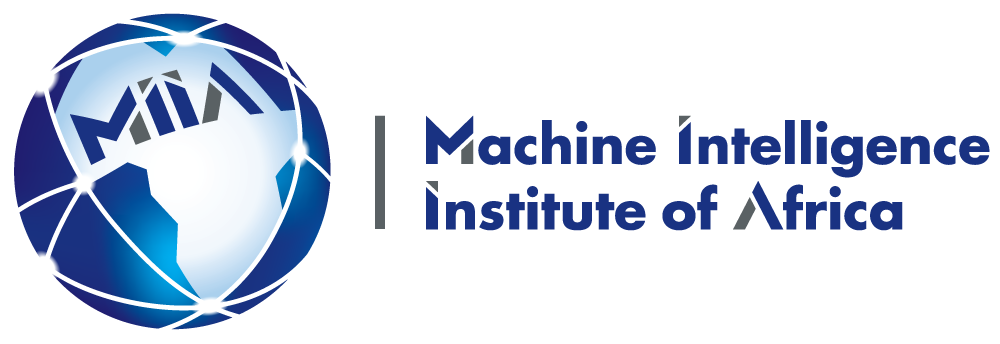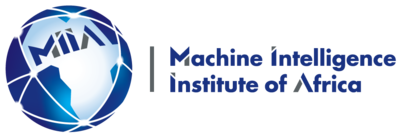(Credit: Democratizing Artificial Intelligence to Benefit Everyone, Dr Jacques Ludik)
The project aims to get an accurate perspective and insights about the democratization and diffusion of human-centric AI in Africa via comprehensive data collection and quality research, whilst helping to drive the adoption of AI on the African continent by engaging in multi-stakeholder, multi-disciplinary research in collaboration with a partner network of excellence. As this project is line with the vision, mission, and objectives of the Machine Intelligence Institute of Africa, this non-profit organization will be acting as a vehicle in collaboration with partners to implement innovative and creative ways of instrumenting the Africa AI Ecosystem so that data can be collected for research, real-time visualization and insights, and actions to help transform Africa through smarter diffusion of human-centric AI, provide guidance to help shape a better and more equitable future for Africans and also become a more meaningful contributor on the global stage with respect to the fourth industrial revolution or smart technology era. The research on the democratization and diffusion of AI in Africa will consist of the interpretation, analysis, reporting, and dynamic visualization of the data collected, as well as developing hypotheses and models, integration and verification of theories, incorporation of complementary interdisciplinary research efforts as applied to African data, presentation of results and insights in digital systems, and the communication of the research outputs via papers and presentations at conferences.
The main purpose of the study is to analyze the state of AI and Data Science in Africa and provide an analysis of constraints to adoption and diffusion building on the business value of AI-based transformation projects. This research project will develop a framework and the systems required for instrumenting the AI ecosystem in Africa, linking key thematic SDG themes and Massive Transformative Purpose (MTP) for humanity goals (see Democratizing Artificial Intelligence to Benefit Everyone, Dr Jacques Ludik) with key dimensions of AI diffusion and providing an accurate perspective and insights about the diffusion of human-centric AI in Africa within the following buckets: (1) Analysis of Africa, African regions, country level analysis and SDGs and MTP goals most relevant to Africa [AI-diffusion, job creation, polarization and economic growth]; (2) Analysis of African entrepreneurship, investment, academia, non-profit organizations [AI-diffusion and entrepreneurship, role of higher education and industry, SMEs]; (3) Analysis of African public sector, governments, academia, non-profit organizations, SDGs and MTP goals [AI-diffusion, security and conflict issues, public procurement, governance, public good]; and (4) Analysis of African businesses across multiple industries [Individual micro decisions on implementation and adaptation of AI by companies and end-users and measuring].
The methodology includes manual mapping (bottom-up) by using our researcher network and partner data sources, websites, LinkedIn posts, physical field visits and engagement with communities in each country and region. Key elements of this work include: (1) Instrumenting the AI ecosystem in Africa through methodologies of innovative multi-layered data collection – wikis, surveys, training, certification, and capacity building effort; and (2) Research and innovation effort, collaboration, and co-creation through understanding the process for AI diffusion, obtaining empirical data, deriving policy implications, and modeling the AI-innovation-productivity link. This study will draw from a pool of submissions by ecosystem members. The aim is to understand the influence of AI across industry sectors and academia (e.g.,
universities, colleges, research institutions, and schools), business (e.g., corporates, SMEs, and startups), public sector (e.g., national and local governments and policymakers), non-profit organizations (e.g., NGOs, NPOs, communities such as MIIA, Data Science Nigeria, AICE Kenya, Kenya AI, Zindi, MLDS-Africa (Deep Learning Indaba), AIMS, Groups at universities, Meetup Groups, Cirrus, etc.), investors (e.g., Venture Capital and Private Equity), and multi-stakeholder partnerships. It is important to understand how AI drives business value on several dimensions of performance and productivity (at the organizational and process levels). The research process (responding to the research question, making discussions, interpretations and comparisons, and formulating recommendations) will be based on a review of relevant case studies from industry practitioners in the African ecosystem.
The expected results area clear and holistic view of the AI ecosystem in Africa, detailing all the independent elements within the African AI ecosystem; providing multi-layer instrumentation of the AI ecosystem in Africa; and immersion in consortium wide research, enrichment of both historical and nascent research effort, implementation of research across multiple SDGs themes and MTP goals relevant to the African development agenda. The outcomes include doing further research and analysis within the broad spectrum of AI resources in Africa; enriching and substantiating all Africa relevant research being carried out by consortium members, and consolidated efforts; and positioning MIIA as the key entity responsible for the implementation of research being carried out by consortium members. AI covers a wide range of technologies, including machine translation, chatbots and self-learning algorithms, all of which can allow individuals to better understand their environment and act accordingly. The result desired in the context of this work is to stimulate all the recipes that will aid the creation of a vibrant AI ecosystem with the stakeholders that form the basis of building AI success. The intention is to draw from multiple research perspectives across regions in both the developed and the developing world drawing on elements of AI diffusion as follows: the role of higher education and policy to integration of AI education across disciplines; economic growth; job creation; ethics, legal and other social considerations; entrepreneurship and small business adoption; security and conflict; and government, AI and public good. The key elements of the approach include the following: (1) collaborating deeper and wider and applying key existing findings to address issues like security issues, job creation and employment; (2) collaborating with think tank organizations in areas relevant to the SDGs and MTP goals, understanding the link between Data Science, AI, machine learning and domains such as life science, computer science, engineering, humanities, and economics; (3) understanding the effects of individual micro decisions on implementation and adoption of AI by companies and other end users; and (4) the technology innovation and entrepreneurship domain is also an interesting domain for further research and exploration in the context of this work.
The project plan makes provision for an instrumentation track to collect the data for research purposes and a research track to analyze, interpret, report, publish and communicate the outcome and insights. The email address for funding support and enquiries is info@miiafrica.org.
| Year | Instrumentation Track | Research Track |
| Over all 4 years |
Data Collection via MIIA’s objectives and initiatives will be used as a vehicle for innovative and creative ways of instrumenting the Africa AI Ecosystem so that data can be collected for research and expanded, enriched, and enhanced continuously:
|
Enriching our research with respective interdisciplinary research packages of the broader Democratizing Human-centric AI in Africa project. The research on the diffusion of AI in Africa will consist of interpretation of the data collected, analysis, reporting, dynamic visualization, setting of hypotheses, integration, and verification of theories/hypotheses/models of complementary interdisciplinary research efforts as applied to African data, presenting of summarized results and insights in digital systems where applicable, and the communication of the research outputs via papers and presentations at conferences. |
| Year 1 |
Instrumentation
|
Research Focus Areas: Analysis of Africa
Interdisciplinary Research Inputs
|
| Year 2 |
Further Instrumentation of the African AI ecosystem in Africa: Entrepreneurship,
|
Research Focus Areas: Analysis of African
Interdisciplinary Research Inputs
|
| Year 3 |
Further Instrumentation of the African AI ecosystem in Africa: Entrepreneurship,
|
Research Focus Areas: Analysis of African
Interdisciplinary Research Inputs:
|
| Year 4 |
Instrumentation of how businesses across
|
Research Focus Areas: Analysis of African
Interdisciplinary Research Inputs
|
The Machine Intelligence Institute of Africa (MIIA) objectives and initiatives for instrumentation and data collection of the Africa AI Ecosystem:
| MIIA Objective / Initiative | Instrumentation / Data Collection | |
| Community | Growing and connecting an innovative and collaborative community of Machine Intelligence, AI, Smart Technology and Data Science enthusiasts, engineers, researchers, practitioners, entrepreneurs, executives, lay persons, experts, and related partner communities across Africa. | Collect data about all AI-related communities on the African continent such as MIIA, Data Science Nigeria, Kenya AI, Zindi, MLDS-Africa (Deep Learning Indaba), AIMS, Groups at Universities, Meetup Groups, Cirrus, etc. through surveys, community engagements, community databases, internet search, etc. |
| Training | Facilitating, promoting, and accrediting training courses in AI, Data Science, Machine Learning, Data Engineering, Data Analysis, and related fields to grow the knowledge and skill sets of as many people as possible on the African continent and beyond to help transform Africa and help shape a better future for all. | Collect data of individuals doing AI-related training at MIIA and other training institutions through MIIA Website, training course participation, internet search, training institution databases and collaboration |
| Certification | Certification of knowledge, practical experience, and skills on an individual level for AI related roles such AI-related business leadership and management, Data Scientists, AI Experts, Machine Learning Engineers, Data Engineers, Data Analysts, AI and Machine Learning Researchers, AI-related Software Development, Business Analyst, AI Implementation Project Management, etc. | Collect data of knowledge, practical experience and skill levels of individuals that are working on AI-related projects/initiatives through a “LinkedIn” type of system for Africa AI-related practitioners on the MIIA website |
| Validation | Validating and advising on ethical, robust, and trustworthy AI implementations, practices, and guidelines at a business-, organization-, and governmental level. | Collect data about how businesses, organizations, and governments in Africa implement AI solutions from an ethics, robustness, and trustworthy AI perspective through validation projects, surveys, internet search, etc. |
| Entrepreneurship | Establishing smart technology centres of excellence across Africa in collaboration with partners to deliver smart technology entrepreneurs that help to transform the African business landscape. | Collect data about entrepreneurs and start-ups in Africa through surveys, internet search, start-up bootcamps, smart tech center of excellence hubs, VCs, etc. |
| Projects | Delivering and facilitating impactful & transformative Sustainable Development Goal (SDG) and MTP goals related projects across Africa. | Collect data about SDG and MTP goals related projects in Africa where AI can play a role through surveys, internet search, collaboration with partner organizations |
| Research | Delivering research and applied research contributions and projects to improve the state-of-the-art in Artificial Intelligence, its applications, and fusion with other smart technologies in collaboration with partners in the academic, non-academic, business, or public sector. |
Collection data of AI-related research in Africa; showcase Africa AI-related researchers through a “LinkedIn” type of system on the MIIA website |
| Ecosystem | Facilitating, delivering, mapping, and monitoring the growth and impact of the AI community, key players, and socio-economic initiatives within the African Artificial Intelligence Ecosystem. | Dynamic mapping, monitoring, and visualization of the African AI Ecosystem |
| Contributors | Providing an environment for contributors in the MIIA community and elsewhere to share information, knowledge, resources, case studies, learned experiences, research and projects through the MIIA website and African Artificial Intelligence Wiki. | The AI Africa Wiki is a decentralized system of collecting data of the Africa ecosystems by contributors on a country-level |


